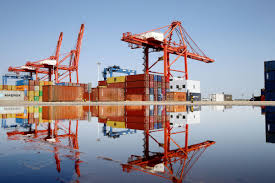China’s Export Surge Surprises Analysts Amid Rising US Tariff Tensions
China has defied expectations with an 8.1% year-on-year rise in exports for April, ahead of pivotal US-China tariff talks in Geneva. The growth, far above analysts’ 2% forecast, comes despite intensifying trade tensions with Washington, suggesting a strategic shift in Beijing’s trade flow to cushion the impact of soaring US tariffs.
According to figures released by China’s customs bureau on Friday, May 9, exports to Southeast Asian nations like Vietnam, Indonesia, and Thailand recorded notable increases, while shipments to the US plummeted by 17.6% month-on-month. Experts say the data signals a rerouting of goods and a broader supply chain realignment.
Stephen Innes of SPI Asset Management described the shift as a “structural repositioning,” adding, “Vietnam looks set to become China’s offshore escape hatch for US-facing goods.” The redirection appears to be Beijing’s tactical response to US tariffs as high as 145%, which China countered with levies reaching 125% on American imports.
Despite the escalating trade war, ANZ Research analysts noted that China’s pivotal role in global manufacturing makes it difficult to isolate. “The expected outcome of Asia-US trade talks suggests no imminent collapse in China exports,” they said.
The April data comes ahead of a critical meeting in Geneva — the first formal negotiations since President Donald Trump’s tariff crackdown aimed at bringing manufacturing jobs back to the US. While Washington hopes to ease tensions, Beijing insists it will defend its interests without compromise.
Zhiwei Zhang, chief economist at Pinpoint Asset Management, credited the export bump to older contracts and transshipments through other nations. However, he warned, “Trade data may weaken in the coming months as new tariffs bite.”
On the import front, China recorded a slight decline of 0.2%, beating forecasts of a 6% drop. Analysts interpret the modest dip as a sign of lingering domestic demand challenges. In response, Beijing has rolled out economic stimulus measures, including interest rate cuts and reduced bank reserve requirements.
Efforts to revive the troubled property sector also intensified, with the central bank slashing mortgage rates for first-time homebuyers with long-term loans from 2.85% to 2.6% — the largest cut since September.
Still, some economists remain cautious. Gary Ng of Natixis warned that even if tariffs are eased after the talks, uncertainty will continue to drive a long-term decoupling between the two superpowers.



[…] interview with Nollywood On Radio, Elliott, who represents Surulere in the Lagos State House of Assembly, said he was forced to spend the night in his office due to the curfew imposed during the protests. […]